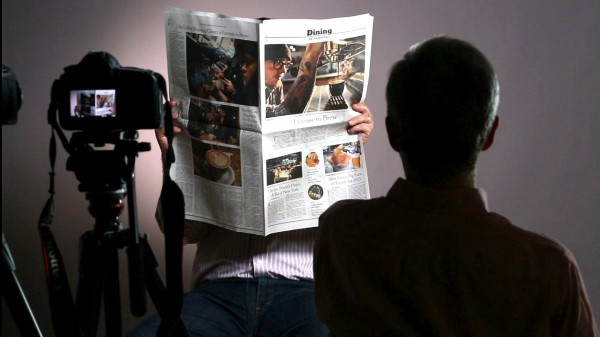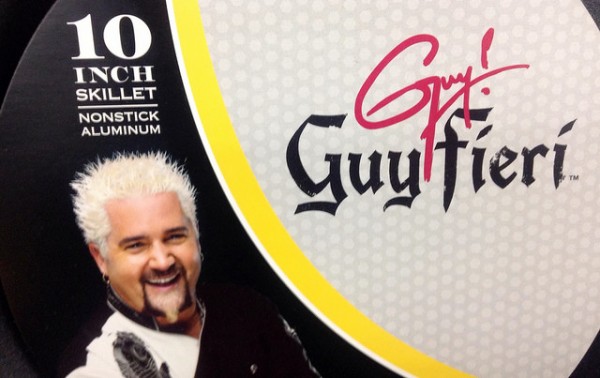Pete Wells: NYTimes Food Critic, Accidental Sociologist
The November issue of Contexts will feature an in-depth Q & A with Pete Wells, restaurant critic for the New York Times. Because we’re impatient and very excited about the interview, we’ve decided to post sections we couldn’t fit in the magazine as a preview.
Throughout his exchange with sociologist Josh Page, Wells confirmed our suspicion that skilled restaurant critics have a sociological sensibility and commitment to the craft of communication.

Josh Page: I’ve read that you mostly review restaurants with dining companions. Is it difficult to isolate your experience from theirs? From a sociological perspective, we would think that opinions are being shaped in the interaction between people and it’s a social process. Is that something you’ve had to deal with?
Pete Wells: Oh yeah, that’s a real phenomenon. I mean, that’s a real phenomenon. I kind of try to strip that out and figure out what I think, but I’m not uninterested in what other people think. I’m particularly interested in when other people are just having a good time.
JP: That’s a good point.
PW: You know? Because I’m working. I’m also talking to people and sometimes catching up with people I haven’t seen for a while or meeting someone new, but I’m working. They’re not. And so it may be easier for them to get the gestalt of the place than it is for me, because I’m trying to break it down, and they’re experiencing it all together. So there’s one person at the table who’s coming at it analytically, and everybody else is coming at it experientially.
Sometimes their experiences are really useful to me. Sometimes I’m like, “Why was everybody not having a good time? Could it be that the room’s too bright? Could it be that the chairs are uncomfortable?” So sometimes the mood of the people you’re with can be a useful barometer of what the restaurant’s getting right or wrong.
JP: A Times review can change the place that’s reviewed. Do you think about the effects of your reviews when selecting places to review and writing reviews?
PW: I guess I try not to think too much about the effect of the review, but there are times when I do think about the effects of the review a lot. Like, a place that I think is really good but it’s been overlooked. Then I get really excited! It’s like, “I like this place, and people aren’t talking about it, and they should be talking about it!” That’s the best possible scenario. I did this huge, to me, monumental, not ridiculously long, but it took a lot of time, on Korean food in Queens and it was kind of a labor of love. I just thought it was one of the most diverse and high quality concentrations of a certain kind of food in one place, and that it wasn’t, I thought, sufficiently appreciated! It should be celebrated!

PW: The reverse is, “Why is everybody talking about this place?” You know? I did a review of this Tex-Mex place at the beginning of the year— It was, at the time, sort of the hot restaurant in New York, and I really couldn’t figure it out. It’s a complete mystery to me. So then the review becomes like more of a corrective, I guess.
JP: I want to read you a quote that really struck me. You said, “I also look for restaurants that might serve as a diving board from which I can launch a discussion of some idea that seems interesting or important. This may be a style of dining that says something about the mood of the city.” Can you talk about that a little?
PW: I don’t know if I had a place in mind when I was saying that, but an example might be a review from back in January of this place called Kappo Masa. It just struck me as phony luxury. It was really, really expensive, but without the payoff you would want for that kind of money. So the allure of the luxury brand, which is what that kind of restaurant is planned on. The brand of Masa. You know, chefs have become brands, and that is not entirely a bad thing, but I think what becomes dangerous is when—well, dangerous to the unsuspecting diner—is when you’re paying for the brand and not getting the quality that it’s supposed to represent.
JP: Absolutely.
PW: I’m not sure I’ve been totally clear about that, but I thought the bigger issue was that there’s kind of so much money sloshing around the city and looking for someplace to go—you know, money needs to go somewhere, I guess! And so you have these restaurants that are not really designed for people who pay attention to where their money goes. They’re for people who have other priorities than getting the best possible meal for their money.
JP: Yeah. It also seems reflective of the extent to which dining in certain restaurants is a status marker—
PW: Yeah, and that’s always been true. That’s always been around, and there’s nothing too wrong about that. Part of my job is to warn the unsuspecting away from the places that aren’t going to deliver anything other than bragging rights that “you were there.” But for the purposes of writing the review, I assume that people want good food.
It’s not always true. It’s just not! That’s not what everybody’s there for. But I kind of write for the reader who is there for that. And then I figure everybody else can maybe get what they’re looking for out of the review, too, but fundamentally I should be there for the reader who wants me to tell them if the food’s worth eating and worth paying for, even the places where you go for other reasons. That’s what a restaurant does, too.
JP: Yeah, yeah. And sometimes, it’s for the spectacle, which can be very enjoyable.
PW: Yeah! I mean, when I reviewed the 21 Club, I really thought it was not good enough for how much they charge for it, and I didn’t give them any stars, but it was still kind of a positive review, because I think it’s a great place with not very great food! [both laugh]
JP: Has the phenomenon of the celebrity chef affected food reviewing?
PW: Very much. There’s the mass media celebrity chefs—people who are on TV. So, if they decide to do a restaurant, they automatically get a lot of publicity and usually a pretty big crowd. All of that, the best known example of that that I reviewed is the Guy Fieri restaurant, where, you know, was being talked about so much just because of his fame. So, he got a lot of hype when the place opened, and I thought that made it a legitimate subject of interest.

And there’s a somewhat less mass media version of celebrity, which is just the critically acclaimed and popular chef who isn’t on TV. Daniel Boulud is a great example. He’s been on TV, but he’s not a TV star. He’s a kitchen star and very successful restauranteur, so he’s a different kind of celebrity chef. He’s not Guy Fieri.
But there are a lot of these guys around now who are famous for being good at what they do, which is great, it’s great. It’s a great thing—they’re famous for the right reasons, but because they’re famous, they can kind of take the oxygen out of the room for some of the other places, so I try to keep that in mind. I’m very watchful of trying to make sure that the restaurants that don’t have all of that “star” power at their disposal still get some attention.
JP: Unlike a lot of professions, with food reviewing, there’s not a certification process or special training or formal mechanisms that qualify somebody. So in your opinion, what really qualifies somebody to be a professional food reviewer? Or I could put it another way—if you were to hire your replacement, what would you look for?
PW: You want somebody with a really distinctive point of view… So it can be somebody who knows, say, the cuisines of the world. Probably the best example of that in the U.S. would be Jonathan Gold [restaurant critic for the Los Angeles Times], who has just made a specialty of understanding and exploring the cuisines of Los Angeles. But it could also be somebody who just has a strong critical sensibility that they can express in words. So writing ability and knowledge don’t always go together! But I think you can have a very successful critic who knows a lot and who is a serviceable writer, and you can have a very successful critic who doesn’t know quite as much but has a command of writing and thinking and analysis—particularly if that person is prepared to do a little reporting—that can be the difference. You don’t necessarily need to know everything going in, but you should know it by the time you sit down to write.
Josh Page is a sociologist and criminologist at the University of Minnesota. He’s also a food critic for HeavyTable.com.

Comments 11
Gary Alan Fine
October 12, 2015Note to the editors:
If you want a sociological perspective on the craft of reviewing, you might wish to talk with Dennis Wheaton, a UChicago sociology Ph.D. (and co-author with Glenn Carroll on several academic papers) and a long-time (and excellent) reviewer for Chicago magazine.
Letta Page
October 12, 2015Thanks, Gary!
A. Nonnie Muss
October 13, 2015Did Flickr change their terms of service? It used to be that they required anyone lifting a photo for publication elsewhere to link directly to it, not just put the owner's name in tiny type underneath it. And that is, of course, assuming that there's a Creative Commons license permitting publication elsewhere. I find it hard to believe a professional publication should be unaware of such things.
Letta Page
October 16, 2015Thanks for asking about the photo -- we will edit to correct that the photo of the Guy Fieri cookware does link back to Flickr as it's supposed to (and the other images do). The first image in this story was provided directly to us as a courtesy by the New York Times. All Flickr photographers are notified of where and how their photos are used on our website and if we want to use them in print, we ask permission. This is very important to us, and we appreciate you pointing out the missing link.
Letta Page
Alex Slocum
May 14, 2016Food Critics for Safe Water
The Flint, MI Water Crisis has given rise to the proposed Safe Water Act of 2016 Resolution. A resolution that simply states that safe water is defined as water that has been processed to remove all harmful bacteria and minerals from water prior to human consumption via drinking or food preparation. And providing water in any form that is unsafe to anyone is a criminal offense and a violation of a person civil rights.
Restaurants that want who comply, and wanted to have a recognized symbols for their marketing and industry marketing such as Trip Advisor and Yelp, would receive the Safe Water Symbol via their local Food Critics. Food Critics turned Beverage Critics is our best hope that consumers are indeed getting healthy water when dining at a restaurant that has earned the symbol.
Food/Beverage Critics would enroll via the www.safewateract2016.com Blog, or Food Critics for Safe Water Group at LinkedIn.
http://www.cspinet.org/foodspeak/cando/cando.htm
AliPiesse
February 25, 2020Context is a website where you can get blogs with certain departments etc. Their sociology for the people on accidental sociologist that has thoughts on exchanging and also you can visit https://essay-writing-service.us.org/coursework-help-service to solve your thesis task easily. Join their website for more information.
alipiesse
February 25, 2020Context is a website where you can get blogs with certain departments etc. Their sociology for the people on accidental sociologist that has thoughts on exchanging and also you can visit https://essay-writing-service.us.org/coursework-help-service to solve your thesis task easily. Join their website for more information.
Reina Hegmann
June 19, 2020Die PC-basierte Verbindung mit Verführungen hat die gesamte Idee der PC-Umleitung revolutioniert. Ich möchte diese klick hier zum Spaß online besuchen. Sie haben die grundlegenden Aussagen zur Bekämpfung von Ablenkungen aufgenommen, die unbedingt zu berücksichtigen sind.
professional seo agency
August 6, 2020Google, unsurprisingly, likes genuine back hyperlinks.
Tif
August 23, 2020And we were forced in a sports college even on such a topic to write a term paper with the details of how and what to do in order to achieve certain results, that is, also with the calculations. Of course, I did not work out and did not fit together, it's good that my friend threw me a list of services at Writing Judge which is the most detailed information on these companies. There I found and ordered it for myself. I did not even expect to agree to write on such a strange topic, but that's okay, you can find there any company that will write anything and at the same time quickly. So I'd like you to meet me. I hope I was able to help someone.
Robert
May 18, 2021It is really a helpful article thanks for your best effort.